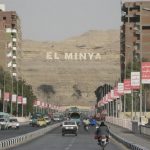The following document, an email from Hillary R. Clinton (forwarding an email she’d received) , dating back to Nov. 2011, describes some interesting behind-the-scene interactions between the Egypt’s ruling Supreme Council of the Armed Forces (SCAF) and the Muslim Brotherhood. Quite interestingly it confirms some known facts about how the SCAF conspired with the MB against the Coptic Christians.
By Wikileaks –
H: INTEL. SECRET OFFER TO EL BARADEI/MUSLIM BROTHERHOOD-ARMY ALLIANCE
From: Hillary Clinton
To: Jake Sullivan
Date: 2011-11-23 14:23
Subject: H: INTEL. SECRET OFFER TO EL BARADEI/MUSLIM BROTHERHOOD-ARMY ALLIANCE
UNCLASSIFIED U.S. Department of State Case No. F-2014-20439 Doc No. C05788278 Date: 01/07/2016 RELEASE IN PART B5,B6
From: H <hrod17@clintonemail.com>
Sent: Wednesday, November 23, 2011 9:23 PM
To: ‘sullivanjj@state.gov’
Subject Fw: H: INTEL. Secret offer to el Baradei/Muslim Brotherhood-Army alliance Attachments: hrc_memo_INTEL_Secret_offer_to_el_Baradei,Muslim_Brotherhood-Armyalliance.docx
From: sbwhoeop77[mailto:sbwhoeo Sent: Wednesday, 23,201106:56 To:H
Subject: H:INTEL.SecretoffertoelBaradei/MuslimBrotherhood-Armyalliance
CONFIDENTIAL
November 23, 2011
For: HRC
From: Sid
Re: Secret offer to el Baradei/Muslim Brotherhood-Army alliance
SOURCE: Sources with access to the highest levels of the Muslim Brotherhood in Egypt, as well as Western Intelligence and security services.
- During a series of meetings over November 21 and November 22, 2011, senior officers of the Egypt’s ruling Supreme Council of the Armed Forces (SCAF) met discreetly with Mohammed el Baradei , the former director of the United Nations International Atomic Energy Agency (IEA) and candidate for the Presidency of Egypt. These discussions centered on the possibility of el Baradei stepping in as interim Prime Minister in an effort to address the frustration of pro-democracy demonstrators currently clashing with Egyptian Army and Security forces in Cairo’s Tahrir Square.
The SCAF officers believe that el Baradei’s record of political independence from the SCAF will allow him to address the concerns of the demonstrators regarding extended military rule. In these discussions el Baradei demanded assurances that he would not be a puppet of the SCAF, with the freedom to name his own cabinet. The SCAF officers indicated that they would have to consider this, but noted that under any circumstances, the SCAF would remain the ultimate authority in Egypt, pending the conclusion in 2012 of a series of national elections beginning on November 28, 2011.
- (Source Comment: The leaders of the SCAF believe that el Baradei can not only calm the situation Tahrir Square, but due to his long experience at the UN he will reassure foreign businesses regarding political and security stability in Egypt. These officers also believe they can control el Baradei if he accepts the position. One sensitive source noted that el Baradei must certainly know that his position would be managed by the SCAF, but hope his ambition may lead him to accept the offer.
Despite the resignation of the incumbent Prime Minister, Essam Sharaf, and his cabinet, el Baradei has not yet responded to the proposal, and one SCAF officer speculated that the caution diplomat was waiting to see what happens in Tahrir Square over the next week.)
- During the week of November 21, 2011extremely sensitive sources with access to the leadership of the Muslim Brotherhood (MB) in Egypt stated in strict confidence that MB Supreme Guide Mohamed Badie and his advisors maintain a secret and increasingly clandestine relationship with senior advisors to Field Marshall Mohammed Hussein Tantawi and the SCAF, in an effort to establish a relationship that will allow them to cooperate and govern Egypt successfully following the parliamentary and presidential elections scheduled for the fall of 2011.
Despite increasing tensions and political violence as the November 28, 2011 parliamentary’ elections approach, the highest levels of the MB and SCAF agree on the idea that they represent the only two truly established political organizations in the country, and they must work together to gain full advantage from the newly developing political structure in Egypt. The SCAF continues to provide a degree of funding and information to the MB, giving it an advantage over competing secular and religious based political movements.
For its part the MB provides intelligence to the SCAF regarding developments in the smaller and more radical political parties. At the same time, the MB, in coordination with the Egyptian General Intelligence Directorate (GID) and Military Police forces, is working to reduce the level of violence in demonstrations protesting extended military rule.
- This knowledgeable individual, a source with access to the highest levels of the Egyptian GID, states in confidence that the MB and SCAF are becoming increasingly frustrated with each other, the MB over what they see as heavy handed missteps by the SCAF that serve only to increase popular support for more radical political and religious groups.
For its part, the SCAF leadership is concerned that the MB has been unable to dampen the level of violence attached to recent demonstrations in Tahrir Square. Prior to November 18, 2011, according to these individuals, MB operatives were able to reduce the level of violence in the pro-democracy demonstrations, even on those occasions where the Brothers joined ongoing demonstrations that had begun to turn violent.
In the opinion of these sources, the groups currently demonstrating in Tahrir Square are so diverse and so frustrated that the MB has been unable to gain any kind of control. In all of these cases the MB maintains public support for early transfer of power to a civilian government. In the opinion of these sources the MB’s immediate concern is to reduce to the level of violence, fearing that if matters get out of hand Tantawi may feel compelled to cancel or delay the parliamentary elections.
- (Source Comment: Speaking in confidence, an individual with access to the leadership of the SCAF stated that Tantawi and his advisors realize that any delay in the November 28 election date will result in increased levels of violence throughout the country. At the same time, reporting from police and Military Intelligence sources indicates that the demonstrations will continue, even in the face of deadly force.
For his part Tantawi has inforMed the MB leadership that the Army and security forces will use increasingly aggressive measures to counter the demonstrators, and he asks that they step up their efforts to reduce the level of violence among the pro-democracy demonstrators.)
- According to knowledgeable individuals, Badie and the other leaders of the MB are also extremely concerned over the growing violence in Cairo.
They note that during recent attacks against the Coptic Christian community in Egypt, the MB and the SCAF worked discreetly to ensure that the military and security forces did not intervene forcefully to protect the Copts as they were besieged by Islamist groups. At that time the MB warned that any serious intervention would set off violent demonstrations among the many small and often radical political groups that formed during the uprising against former President Hosni Mubarak.
In this discussion Subhi Saleh, a lawyer and former Member of Parliament, who served as the MB delegate to the March 2011 constitutional commission, pointed out that discussions between the MB and the SCAF regarding the Copts had been relatively simple, because both sides were not concerned about the fate of the Coptic Christian community.
In the case of the Tahrir Square demonstrations, the MB and SCAF cannot ignore the scope of the movement. According a knowledgeable source, Subhi advised Badie to remember that Tantawi is first and foremost a military man who will be tempted to react with a steady escalation of force if the demonstrators do not begin to disperse. This source believes that Badie agrees with this analysis but added that the MB’s ability to influence the young demonstrators is increasingly limited.
- (Source Comment: One particularly sensitive individual added that Subhi, speaking on behalf of Badie, warned SCAF officers that the MB believes an increasing number of Egyptian Army conscripts are sympathetic to the Tahrir Square demonstrators. At the same time, Subhi stated in confidence that MB sympathizers associated with the SCAF have advised that the GID is continuing well established, discreet liaison discussions with the Israeli Mossad, providing Tantawi with a vehicle to address potential areas of conflict with Israel. The Brothers fear that through this relationship Israel can influence and manipulate the SCAF, particularly regarding support for Hamas and other Palestinian groups, as well as border security.)
- In the opinion of these knowledgeable sources, the MB and the SCAF will continue to work together secretly in an effort to establish a stable government in Egypt. At that point they can be expected to begin competing aggressively with each other for final control of the country. Both bodies are particularly interested in creating a secure environment throughout the country, looking to reassure foreign investors and tourists. These individuals believe, however, that Egypt will see repeated episodes of often intense violence as the members of the pro-democracy movement become increasingly frustrated by the domination of the political process by the established leaders of the military and the MB.
________________
https://wikileaks.org/clinton-emails/emailid/12549?fbclid=IwAR2huCOIbX9xHDtsoOHZW_fLbkxTTw6WUXst_PVdX4xvqPqk-pfvbLNzzRk





